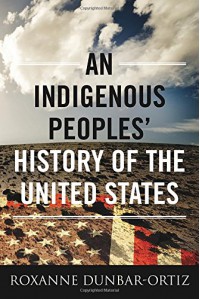Review: An Indigenous Peoples' History of the United States

First off, let me say that this book is great and it is desperately needed. While I have long turned my ears to the cries of injustice, the echoes of the indigenous peoples of the Americas have rarely made the impact they do here. Why? Because we are taught so little. Because in the spectrum of U.S. history, it is relatively ancient. Because there are so few today who raise their voices and demand to tell the story. Sure, we know the stories we were told in elementary school were erroneous. We know Columbus was not worth our celebration. We know Thanksgiving is a lie. We may even know the big events: The Trail of Tears, Little Bighorn, etc. I may be speaking out of place, but I would venture to guess most of us, even those who know the history of injustice in the United States, do not know all this. Certainly, I did not.
And so this book is needed. The genocide, the broken treaties, the lies, the programs that blatantly dressed in the garments of unabashed racism (all of which continued much much longer than I had imagined)--all that is spelled out so clearly here. And I must sincerely thank the author for having the courage and insight to put it all on paper.
That said, An Indigenous Peoples' History of the United States reads a little too heavily like a textbook. And like other textbooks, it is a textbook with an agenda. In some ways, that's good, because we need a textbook that tells the other side of the story; but in the same way school textbooks imply that Indians are uncivilized brutes, An Indigenous Peoples' History... implies that the white man is savage and greedy. This angle doesn't bode well for a work that should educate, not finger point. In fact, this book does little to paint the indigenous people of North America as much more than victims; I would've appreciated learning more about their history sans the white man. If An Indigenous Peoples' History... is indeed meant to counter the school textbook, it is my feeling that it should stand as an anti-textbook and bear as little similarity to the textbook lies as possible.
Additionally, the book is repetitive at times, foreshadowing an event and then, when chronologically appropriate, retelling those details in almost the same words. Surely, this book would not have suffered from tighter editing.
Minor quibbles aside, this book is important. It may not be the most riveting story of indigenous persecution (though it has turned me onto finding some of those works), but it is likely the most complete, relatively concise work on the subject. Those interested in or who feel obligated to learn of the injustices perpetrated by the United States throughout history should consider this one an essential read.
 1
1



